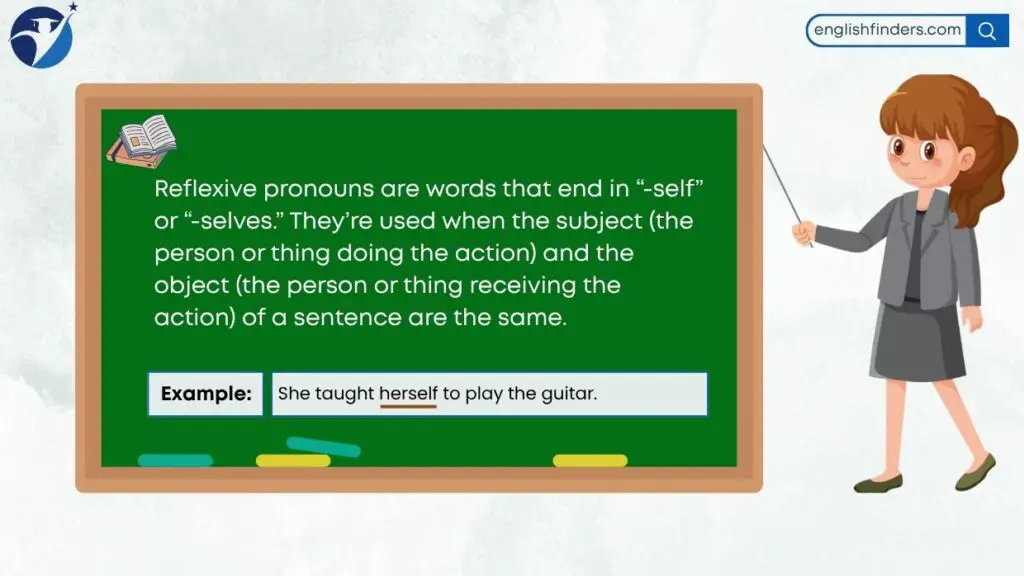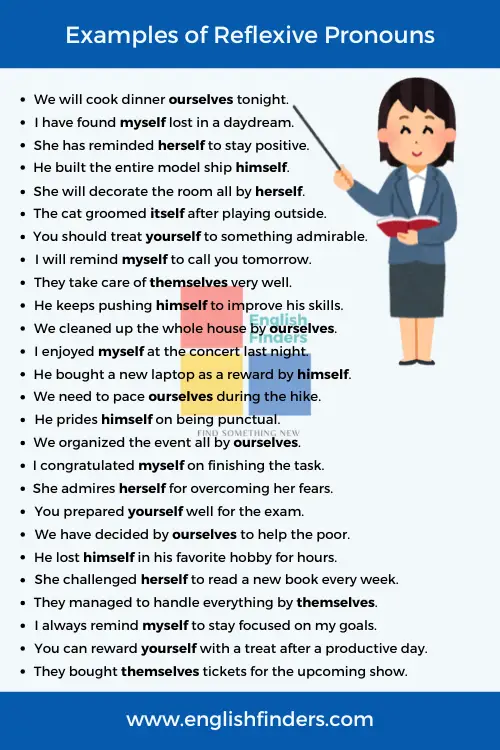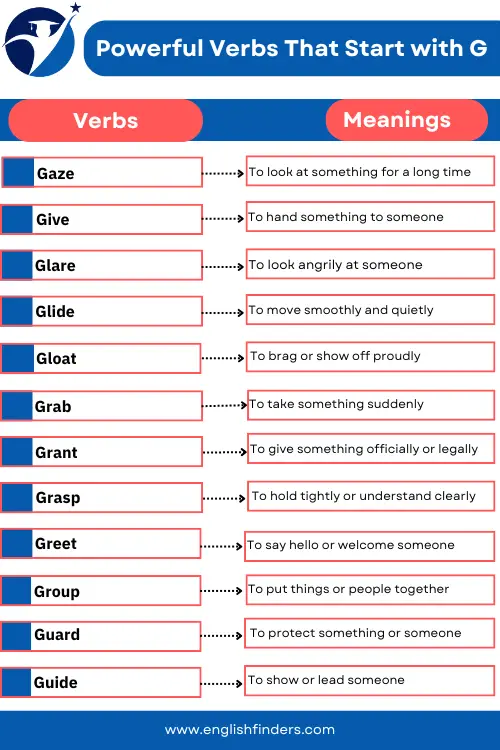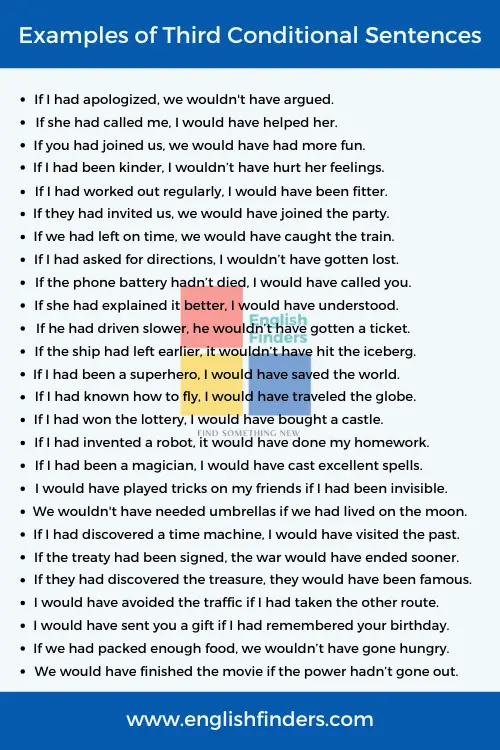Last updated on June 11th, 2025 at 04:50 pm
You might have come across words like myself, yourself, or themselves before. These are examples of reflexive pronouns, and they serve a unique role in our sentences. So, what is a reflexive pronoun in English? In this lesson, we’ll unveil the definition of a reflexive pronoun and look at when and how to use reflexive pronouns in sentences, along with 50 fun examples to show them in action.
What Are Reflexive Pronouns in English?
Quick Navigation

Reflexive pronouns might sound a bit tricky, but they’re actually pretty easy to understand once you know what they do! Reflexive pronouns are words that end in “-self” or “-selves.” They’re used when the subject (the person or thing doing the action) and the object (the person or thing receiving the action) of a sentence are the same. In other words, reflexive pronouns “reflect” back to the person or thing performing the action.
Here’s a quick list of reflexive pronouns:
- Myself
- Yourself (singular)
- Himself, Herself, Itself
- Ourselves
- Yourselves (plural)
- Themselves
Each of these words connects back to a specific subject. For instance, if I’m talking about myself doing something, I’d use myself. If a group is involved, like ourselves or themselves, we use a reflexive pronoun to show they’re acting on their own.
Let’s look at an example:
- “She taught herself to play the guitar.”
In this sentence, she is both the one doing the teaching and the one being taught. Using herself here makes it clear that no one else was involved in the learning—she did it alone.
Reflexive pronouns are useful in three main ways:
- To emphasize actions done by ourselves (“I completed the puzzle myself.”).
- To indicate that the subject and object are the same person or thing (“They helped themselves to snacks.”).
- To add emphasis (“You yourself said it was a good idea!”).
When to Use Reflexive Pronouns
Let’s explore the main situations where we can use reflexive pronouns.
1. To Emphasize Who Is Doing the Action
Reflexive pronouns can emphasize that someone did something on their own without help from anyone else. This is often used to show pride or independence. For example:
- “I painted the entire room myself.”
- “Lisa fixed her bike herself.”
In these sentences, myself and herself highlight that the action was completed by the person alone, without assistance.
2. To Show Actions We Do for Ourselves
We often use reflexive pronouns when we’re doing something for our own benefit or for ourselves. This happens a lot with everyday actions, like preparing a meal or doing something personal. Here are some examples:
- “He trained himself how to play the guitar.”
- “They prepared themselves for the big test.”
In these cases, the reflexive pronoun shows that the subject is acting on their own behalf or doing something personal.
3. To Avoid Repetition or Confusion
Sometimes, reflexive pronouns make sentences clearer by avoiding repetitive language. When the subject and object are the same, a reflexive pronoun keeps us from repeating the subject. Take these examples:
- Instead of saying, “Sara watched Sara in the video,” you’d say, “Sara watched herself in the video.”
- Instead of, “They saw the reflection of they in the mirror,” it’s clearer to say, “They saw themselves in the mirror.”
Using reflexive pronouns here removes the extra words and makes the sentence easier to understand.
4. To Add Emphasis
Reflexive pronouns can add emphasis to certain sentences, especially when someone wants to make a strong point or contradict something. This use is common in spoken English, like in these examples:
- “You yourself said you’d help with the project!”
- “I wouldn’t have believed it if I hadn’t seen it myself.”
In these sentences, yourself and myself stress that the person speaking is either reminding someone or emphasizing their own experience.
50 Examples of Reflexive Pronouns
Here are 50 sentences using reflexive pronouns across different verb tenses to help you see how they work in various contexts.
- I taught myself how to play the piano last year.
- She is learning to drive herself to gain more independence.
- They prepared themselves for the competition all summer.
- We will cook dinner ourselves tonight.
- You can complete the project yourself if you’re up for it.
- He introduced himself to everyone at the party.
- I have found myself lost in a daydream.
- They saw themselves on TV during the news broadcast.
- She has reminded herself to stay positive.
- You should challenge yourself to do better every day.
- We enjoyed ourselves at the beach last weekend.
- He built the entire model ship himself.
- I caught myself staring at the sunset in awe.
- She will decorate the room all by herself.
- They often talk to themselves while solving problems.
- He can’t believe himself after winning the championship.
- We introduced ourselves to the new neighbors yesterday.
- The cat groomed itself after playing outside.
- You should treat yourself to something admirable.
- She hurt herself while attempting a challenging yoga pose.
- I will remind myself to call you tomorrow.
- They take care of themselves very well.
- He keeps pushing himself to improve his skills.
- We cleaned up the whole house by ourselves.
- You need to be honest with yourself about your goals.
- She has caught herself laughing at an old memory.
- I enjoyed myself at the concert last night.
- They will be surprising themselves with their creativity.
- He bought a new laptop as a reward for himself.
- She often finds herself rereading her favorite books.
- You should give yourself more credit for your hard work.
- The children were able to entertain themselves with board games.
- We need to pace ourselves during the hike.
- He prides himself on being punctual.
- I always remind myself to stay focused on my goals.
- She challenged herself to read a new book every week.
- They managed to handle everything by themselves.
- You can express yourself however you want in your art.
- We organized the event all by ourselves.
- He sometimes finds himself wondering about the future.
- I congratulated myself on finishing the task.
- They bought themselves tickets for the upcoming show.
- She admires herself for overcoming her fears.
- You prepared yourself well for the exam.
- We have decided by ourselves to help the poor.
- He lost himself in his favorite hobby for hours.
- I often remind myself to stay calm in stressful situations.
- She encouraged herself to keep going despite the challenges.
- They allowed themselves a break after a long day.
- You can reward yourself with a treat after a productive day.
Final Thoughts
Reflexive pronouns may be small words, but they bring a lot of clarity, emphasis, and expression to English sentences. They allow us to clearly show actions that we do for ourselves, highlight independence, or add emphasis to our statements. These words—like myself, yourself, themselves, and others—help us avoid repetition and make our sentences sound more natural.
Frequently Asked Questions
What is a reflexive pronoun, and when should I use it?
A reflexive pronoun refers back to the subject of the sentence and shows that the subject is acting on itself. You should use a reflexive pronoun when the subject and object of the action are the same, like in, “She taught herself to paint.”
How are reflexive pronouns different from regular pronouns?
While regular pronouns like he, she, or they replace nouns, reflexive pronouns like himself, herself, and themselves emphasize that the subject and object of the sentence are the same person or thing. Reflexive pronouns often end in “-self” or “-selves.”
What is the difference between yourself and yourselves?
Yourself is used for a singular subject, meaning one person, while yourselves is used for a plural subject, meaning more than one person. For example, “You should enjoy yourself at the party” (talking to one person) versus “You should enjoy yourselves at the party” (talking to a group).

Azizul Hakim is the founder & CEO of englishfinders.com. He is a passionate writer, English instructor, and content creator. He has completed his graduation and post-graduation in English language and literature.




